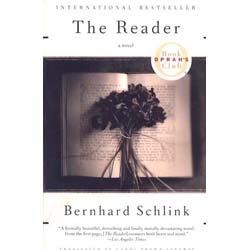 Published: 1995
Published: 1995
Author: Bernard Schlink
Translator: Carol Brown Janeway
Fabulous exploration of guilt

Today is Holocaust Memorial Day, a time to remember the 6 million Jews killed in the Holocaust and all of the victims of Nazi persecution, subsequent genocides, and discrimination today. I urge everyone to visit the Holocaust Memorial Day Trust and Holocaust Educational Trust websites to find out more about the day and read the testimonies of survivors. I am fairly well read on the Holocaust and related issues but every year around this time I try to read a book or watch a film that I’ve not experienced before. This year I chose to read The Reader, the German novel by Bernhard Schlink which was adapted into the Oscar-winning film starring Kate Winslet.
Michael is a fifteen year old student who has a passionate affair with an older woman one summer but she soon disappears from his life. Several years later he encounters her again when she is on trial for crimes committed while she was working as a guard at an Auschwitz satellite camp, specifically allowing 300 women to burn to death in a bombed church.
The Reader is a relatively short book and has quite a sparse writing style, but it manages to pack in a huge amount of issues that will leave you thinking about the book for a long time after you’ve finished. My husband and I often have heated discussions about the legality of charging very junior perpetrators with offences that were not criminal when being carried out and this is touched on, albeit briefly, in the novel. The book also examines the idea of forgiveness – and forgiving those who carried out the Holocaust on behalf of those who died. Can we, should we do this?
The main topic though is the impact of the Holocaust on the children of Germany, those who were either not yet born or too young to have any part in the atrocities but who suffer institutional guilt and resent their parents for the roles that they played – be it as perpetrators or bystanders. As Michael watches his former lover stand trial, he is simultaneously judging his parents for their behaviour during the persecution of the Jewish people. It’s a fascinating psychological exploration of an exceptionally complex issue. Yet it never feels complex or like a textbook. It’s a fabulous read.
In amongst all of the difficult issues contained there is also a very beautiful, tender and erotic love story. We know we shouldn’t like Hanna, she’s arguably committing a crime by having an affair with a teenager, but we get to know her frailties and feel a degree of sympathy for her. In itself that is problematic, but an issue that fascinates me – why did people who in other circumstances be regarded as “normal” become cold-blooded killers?
Of course on Holocaust Memorial Day we should have the victims of persecution must be uppermost in our minds but unless we can also understand the behaviour of perpetrators then we will find it harder to stop genocide in the future.

I read this book last year and thought it was wonderful for all the reasons you mention. I think it is a must read. I also really liked the movie.
I haven’t seen the film for a good few years now, must look it out again.